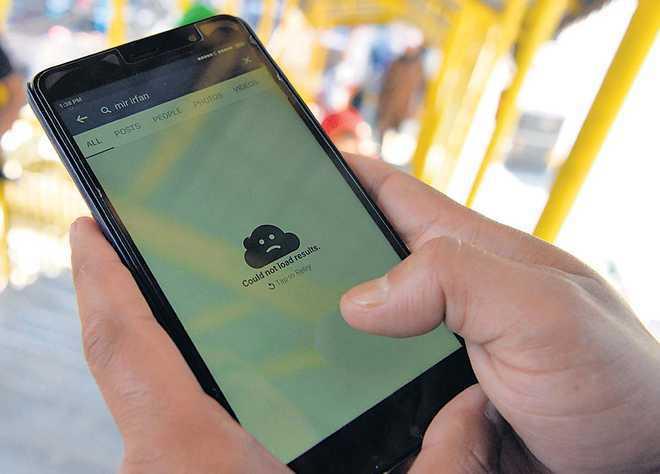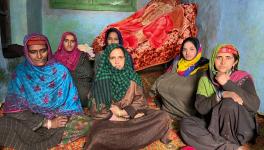COVID-19 Lockdown: In J&K, Students Struggle to Follow Online Classes with 2G Internet

Representational Image. Image Courtesy: The Tribune India
It has been four days, since Rohit Bashir, economics professor at Government Degree College, Kulgam, has been unable to upload his lecture - a 14 minute video - for his students. As soon as the lockdown was imposed, the Education Department switched to online classes for students across Jammu and Kashmir. But for the teachers and students alike, 2G internet has rendered them helpless.
"I teach Economics from home. Live video is impossible. I record at home and later upload them on FB (Facebook) and YouTube. On an average, it takes 6-7 days to upload a 15-minute video on YouTube and 3-4 days to upload on Facebook," Bashir told NewsClick.
The slow internet speed has made students skip the classes as it takes a lot of time to play the video. "Students find the classes boring and they prefer to skip the classes because of the low speed. Trust me, I wake up 10 times during the night just to ensure that the videos are getting uploaded," added Bashir.
With the lockdown extended to May 3, and the number of COVID-19 cases touching 300 in Jammu and Kashmir, the Union Territory is still grappling with the "archaic" 2G low speed internet. Meanwhile, in reply to the Supreme Court (SC) notice to the administration in a petition to restore 4G speed in the backdrop of the COVID-19 crisis, the Jammu and Kashmir Home Department has claimed that 2G internet has not "posed any hindrance to COVID-19 control measures."
Also watch: J&K: Coping with Double Lockdown Sans High-Speed Internet
"Unable to access online knowledge, the youth of Jammu and Kashmir is not facing only a physical and social lockdown but psychological as well. In addition, all this will lead to more divide among the youth of J&K that already exists there at different levels -national, regional and intra-regional," said Hakim Singh from Jammu.
While administration has said that the restrictions on the internet will extend till April 27, the people remain skeptical. "While these restrictions have not posed any hindrance to COVID-19 control measures, they have reduced incidents of misuse of social media by way of uploading and circulation of provocative audio/video content, fake news, rumour mongering, coordination of terror activities and other such acts that rely upon high speed mobile connectivity," said the order issued by Shaleen Kabra, IAS, Principal Secretary to Home Department, J&K government.
The abrogation of the special status of Jammu and Kashmir in August 2019 was followed by the longest internet shutdown in the erstwhile state that was partially lifted on January 25, 2020, with the restoration of 2G internet.
"In the aftermath of abrogation of special status, as they say, J&K has integrated fully with India but not its youth. First, due to the socio-economic and political breakdown and particularly, the internet shutdown. The absence of 4G in current COVID-19 crisis has not only affected the common person but has made youth the worst sufferers. The youth, unlike the rest of world, are debarred from studying online which further prevent them from completing their ongoing educational courses on due time," Hakim Singh added.
People working from home have also the same story to narrate. To them, 2G has added to their existing woes. "Life has become hell because of 2G. Work from home is difficult. Not everyone has broadband to rely upon. Few use mobile hotspots as internet in their laptops. At times, it takes five minutes to send a mail. Forget watching fun videos, movies or passing time amid this lockdown," said a man in his 40s from Jammu.
Get the latest reports & analysis with people's perspective on Protests, movements & deep analytical videos, discussions of the current affairs in your Telegram app. Subscribe to NewsClick's Telegram channel & get Real-Time updates on stories, as they get published on our website.
























